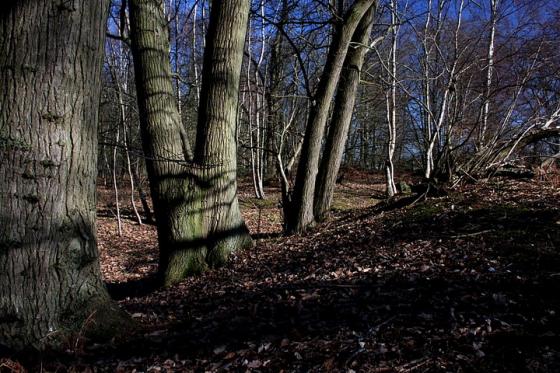He drew her to the top of the mount; there they were clear of the mist, which lay like snow below and round them, covering the morass and the water. The clear cut crescent moon hung over a clump of pines on Mersea.
Rebow looked at it, then waved an arm in the direction. “Do you see Grim’s Hoe yonder? -- That great barrow with the Scotch pines on top? Do you know how it comes there? Have you heard the tale?”
Mehalah was silent.
“I will tell you, for I often think of it, and so will you when you have been told the tale. In the old times when the Danes came here, they wintered on Mersea Isle, and in the summer they cruised all along the coast, burning and plundering and murdering. There were two chiefs to them, brothers who loved one another; they were twins, born the same hour, and they had but one heart and soul; what one willed the other, what one desired that the other desired also. One spring they sailed up the creek to St. Osyth’s, and there they took Osyth and killed her. She had a sister, very beautiful, and she fell to the lot of the brothers. They brought her back to Mersea, and then each would have her for his own. So the brothers fell out whose she should be, and all their love turned to jealousy, and their brotherhood to enmity, and it came about that they fought with their long swords who should have the maid. They fought, and smote, and hacked one another till their armour was broken, and their flesh was cut off, and their blood flowed away, and by nightfall they were both dead. Thereupon the Danes drew their ship up to the top of the hill just above the Strood, and they placed the maid in the hold with a dead brother on either side of her, in his tattered harness, sword in hand, and they heaped a mountain over them and buried them all, the living and the dead together.”Rebow paused, and pointed to the moon hung over the hoe. “When the new moon appears, the flesh grows on their bones, and the blood stanches, and the wounds close, and breath comes back behind their ribs. When the moon is full they rise in the ship’s hold and fall on one another, and if you listen at full moon on the hoe you can hear the brothers fighting below in the heart of the barrow. You hear them swear and curse and cry out, and you hear the clash of their swords. But when the moon wanes the sounds grow fainter, their armour falls to bits, their flesh drops away, the blood oozes out of all the hacked veins, and at last all is still. Then, when there is no moon, you can hear the maid mourning and sobbing: you can hear her quite distinctly till the new moon reappears, and then she is hushed, for the brothers are recovering for a new fight. This will go on month after month, year after year, till one conquers the other and wins the maid; but that will never be, for the brothers are of the same age, and equally strong, and equally resolute.”
From ‘Mehalah’ by the Revd Sabine Baring-Gould (1880).
Baring-Gould was reverend of East Mersea for ten years. He was quite the story-teller and wrote a huge number of books (fiction and non-fiction). It’s suggested he totally invented this bloodthirsty tale – inspired no doubt by various tales he’d come across in his archaeological and folkloric researches though.
sbgas.org/Reluctant_rector.pdf








